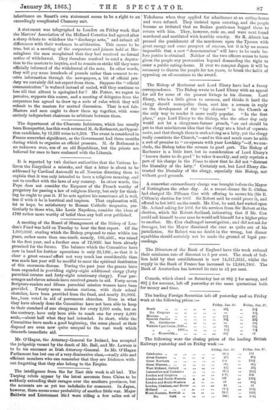The Bishop of Rochester and Lard Ebury have had a
funny correspondence. The Bishop wrote to Lord Ebury with an appeal for aid for some of the poorest livings in his diocese. Lord Ebury, who is a little given to sermons, and thinks it hard the clergy should monopolize them, sent him a sermon in reply on the development of the "lay element" in the Church as the only way to render it more really popular. " In the first place," says Lord Ebury to the Bishop, who the other day only would not let a clergyman-farmer preach, " an end should be put to that mischievous idea that the clergy are a kind of separate caste, and that though there is such a thing as a laity, yet the clergy really constitute the Church,"—and to this and much more he adds a sort of promise to " co-operate with your Lordship "—if, we con- clude, the Bishop takes the sermon in good part. The Bishop of Rochester is a little hurt, but in consideration of Lord Ebury's " known desire to do good " be takes it meekly, and only reprints a part of his charge in the Times to show that he did not "distrust the liberality of the laity." Certainly not, but Lord Ebary dis- trusted the liberality of the clergy, especially this Bishop, not without good grounds.
































 Previous page
Previous page